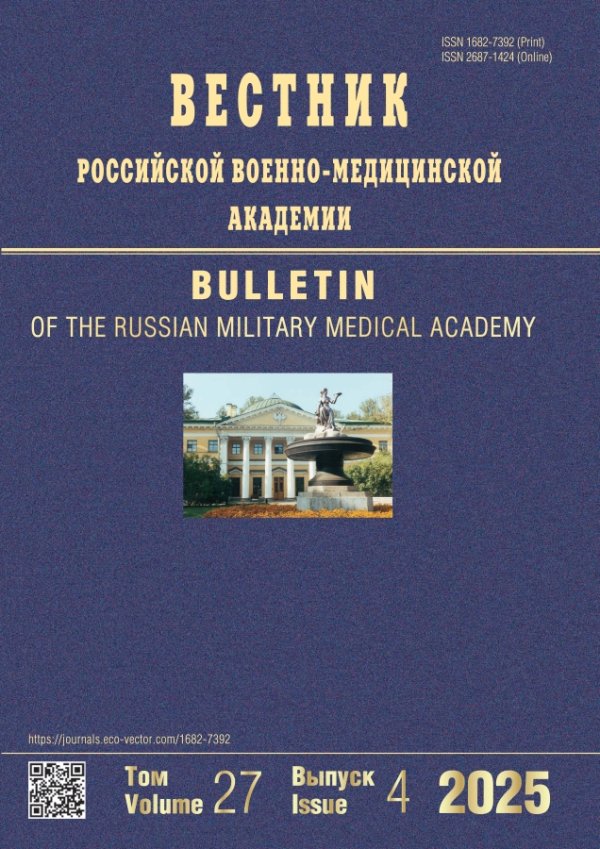A new molecular-genetic panel in the algorithm of diagnosis and treatment in patients with tiroid nodules
- Authors: Romashchenko P.N.1, Maistrenko N.A.1, Krivolapov D.S.1, Simonova M.S.1
-
Affiliations:
- Military Medical Academy named after S.M. Kirov of the Ministry of Defense of the Russian Federation
- Issue: Vol 23, No 2 (2021)
- Pages: 75-82
- Section: Clinical trials
- URL: https://journals.rcsi.science/1682-7392/article/view/64670
- DOI: https://doi.org/10.17816/brmma64670
- ID: 64670
Cite item
Abstract
The increase in the number of patients with thyroid nodules requires the development of the most effective methods of preoperative diagnosis, allowing timely detection and differentiation of follicular neoplasia and highly differentiated cancer. A comprehensive study was carried out, which made it possible to optimize the diagnosis and choice of therapeutic tactics in patients of this category through the use of a new molecular genetic panel. Results of examination and surgical treatment of 60 patients suffering from benign and malignant thyroid gland formations are analyzed, pre-operative diagnosis of which was supplemented by immunocytochemical and molecular genetic methods of studying cellular material obtained during fine-needle aspiration biopsy. The threshold value of the Galektin-3 expression level for the differential diagnosis of follicular neoplasia in the direction of adenomas or well-differentiated thyroid cancer was determined. The significance of the BRAF V600E gene mutation in the detection of papillary thyroid cancer, the features of its clinical course and the determination of rational surgical tactics was proved. The limit value of the sodium-iodide symporter for predicting the resistance of thyroid cancer to radioactive iodine therapy, which determines the need to expand the scope of surgical intervention, has been established. The place of these molecular genetic markers in the algorithm of diagnosis and treatment in patients with thyroid nodules was determined.
Full Text
##article.viewOnOriginalSite##About the authors
Pavel N. Romashchenko
Military Medical Academy named after S.M. Kirov of the Ministry of Defense of the Russian Federation
Email: romashchenko@rambler.ru
ORCID iD: 0000-0002-1405-7660
SPIN-code: 3850-1792
doctor of medical sciences, professor
Russian Federation, Saint PetersburgNicolay A. Maistrenko
Military Medical Academy named after S.M. Kirov of the Ministry of Defense of the Russian Federation
Email: nik.m.47@mail.ru
SPIN-code: 2571-9603
doctor of medical sciences, professor
Russian Federation, Saint PetersburgDenis S. Krivolapov
Military Medical Academy named after S.M. Kirov of the Ministry of Defense of the Russian Federation
Email: d.s.krivolapov@yandex.ru
ORCID iD: 0000-0002-9499-2164
SPIN-code: 2195-5001
candidate of medical sciences
Russian Federation, Saint PetersburgMaria S. Simonova
Military Medical Academy named after S.M. Kirov of the Ministry of Defense of the Russian Federation
Author for correspondence.
Email: mariasimonova62@gmail.com
ORCID iD: 0000-0002-8359-1875
SPIN-code: 6004-1995
clinical resident
Russian Federation, Saint PetersburgReferences
- Brynova OV. Diagnosis of thyroid diseases using liquid and traditional cytology. Russian news of clinical cytology. 2018;22(3–4):16–21. (In Russ.).
- Maistrenko NA, Romashchenko PN, Krivolapov DS. Modern approaches to the diagnosis and surgical treatment of thyroid disorders. Military medical journal. 2018;339(1):37–46. (In Russ.).
- Reshetova ON, Ivantsova AA, Mokeev AG. Fine-needle aspiration biopsy and liquid-based cytology of the nodular goiter: diagnostic value and analysis of the results. Bulletin of the Medical University “Reaviz”. 2019;(3):131–136. (In Russ.).
- Sanabria A, Kowalski LP, Shah JP, et al. Growing incidence of thyroid carcinoma in recent years: Factors underlying overdiagnosis. Head Neck. 2017;40(4):855–866. doi: 10.1002/hed.25029
- Lukyanov SA, Sergiyko SV, Titov SE, et al. Prospects of molecular genetic panels use in the preoperative differential diagnosis of nodular lesions of the thyroid gland. News of surgery. 2020;28(3):284–289 (In Russ.). doi: 10.18484/2305-0047.2020.2.284
- Romashchenko PN, Maistrenko NA, Krivolapov DS, et al. Modern diagnostic and minimally invasive technology in thyroid surgery. Bulletin of the Russian Military medical academy. 2019;(S1):101–105. (In Russ.).
- Romashchenko PN, Maistrenko NA, Krivolapov DS. Modern possibilities of diagnostics and surgical treatment of diseases of the thyroid gland. Izbrannye voprosy klinicheskoj hirurgii. Samara, 2018:189–198. (In Russ.).
- Tavares C, Coelho MJ, Eloy C, et al. NIS expression in thyroid tumors, relation with prognosis clinicopathological and molecular features. Endocr Сonnect. 2018;7(1):78–90. doi: 10.1530/EC-17-0302
- Vuong HG, Altibi AM, Duong UN, et al. Prognostic implication of BRAF and TERT promoter mutation combination in papillary thyroid carcinoma-A meta-analysis. Clin Endocrinol (Oxf). 2017;87:411–417. doi: 10.1111/cen.13413
- Yip L, Sosa JA. Molecular-directed treatment of differentiated thyroid cancer: advances in diagnosis and treatment. JAMA Surg. 2016;151(7):663–670. doi: 10.1001/jamasurg.2016.0825
- Zhang M, Lin O. Molecular testing of thyroid nodules: a review of current available tests for fine-needle aspiration specimens. Arch Pathol Lab Med. 2016;140(12):1338–1344. doi: 10.5858/arpa.2016-0100-RA
- Samohvalova NA, Maystrenko NA, Romashchenko PN. Programmed approach to the treatment of secondary hyperparathyroidism in chronic renal disease. Grekov’s bulletin of surgery. 2013;172(2):43–46. (In Russ.). doi: 10.24884/0042-4625-2013-172-2-043-046
- Cibas ES, Ali SZ. The 2017 bethesda system for reporting thyroid cytopathology. Thyroid. 2017;11(27):1341–1346. doi: 10.1089/thy.2017.0500
Supplementary files











